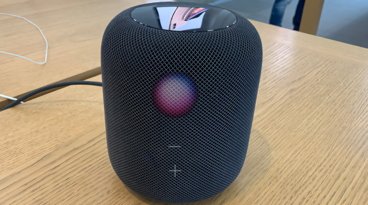Intel would consider making custom chips for major customers like Apple
Intel Chief Financial Officer Stacy Smith made the comments on Thursday at an investor event in London. According to Reuters, he said his company would be happy to produce custom chips based on Intel's own architecture, though they would be less willing to allow rival architectures, like ARM, in their plants.
"If Apple or Sony came to us and said 'I want to do a product that involves your IA (Intel architecture) core and put some of my IP around it,' I wouldn't blink," he reportedly said. "That would be fantastic business for us."
He said for chips not based on the Intel architecture, and for custom-designed cores like the A5 processor found in Apple's iPad 2, his company's only financial gain would be the manufacturing margin. In that case, he said Intel would need to engage in "a much more in-depth discussion and analysis," though he did not entirely rule out the possibility.
Smith went on to say that Intel has made some "tiny" foundry deals in the last year, largely to access new technology. However, proposals from major device makers like Apple are not yet in the works.
He also said the prospect of making chips for others was not the driving force behind Intel's continuing investments in capacity. But the comments make it clear that Intel would jump at the chance to work with Apple on custom processors based on the Intel architecture for systems such as Mac computers.
As for the ARM-based processors Apple uses in its mobile devices, a report from earlier this month claimed that Intel has shown interest in building chips like the custom A4 and A5 to compete against foundries like Samsung. Intel currently makes the CPUs that power its notebook and desktop Mac lineup, but has turned to ARM processors for devices including the iPhone, iPad, iPod touch and Apple TV.
Intel worked with Apple in creating the new high-speed Thunderbolt port found on the latest MacBook Pros and iMacs. It was Apple's close involvement in the project that gave the Cupertino, Calif., company first access to the next-generation technology.
 AppleInsider Staff
AppleInsider Staff














 Amber Neely
Amber Neely
 Thomas Sibilly
Thomas Sibilly

 William Gallagher
William Gallagher
 Malcolm Owen
Malcolm Owen
 Christine McKee
Christine McKee









36 Comments
sometimes it surprises me how much companies like apple affect companies like Intel as they are both massive companies neither which 'struggling' but i suppose any company will jump at the opportunity for more profit
Intel realizes about 2 years too late that it's out-of-the-loop on the single largest profit focus--smartphones and tablets.
ARM is only going to advance it's positions it currently dominates and take on more of Intel's traditional markets.
Apple doesn't give a rat's behind what Intel would offer. In the embedded space Apple has billions invested and it controls the IP and there are several foundries that can meet their demand, even if Samsung gets dropped.
"If Apple or Sony came to us and said 'I want to do a product that involves your IA (Intel architecture) core and put some of my IP around it,' I wouldn't blink," he reportedly said. "That would be fantastic business for us."
I think Apple uses Intel chips on the Mac line so that users can boot into Windows. So that would seem to make the need for custom chips less likely.
On their iPhone and iPad, Apple uses ARM because of their low power consumption compared to Intel. So that would seem to make the need for Intel chips less likely.
Not seeing a spot where it makes sense for Apple to use custom Intel chips.
The problem is: Nobody wants IA chips in the post-PC devices. Not even custom-made ones.
Now, an Intel-manufactured chip with ARM architecture. That would be very yummy...
Would be nice for Macs to have their own architecture again and end the Hackintoshs.
Would be nice for Macs to have their own architecture again and end the Hackintoshs.
Really? I don't own a Hackintosh but this intel thing has been awesome for Apple.